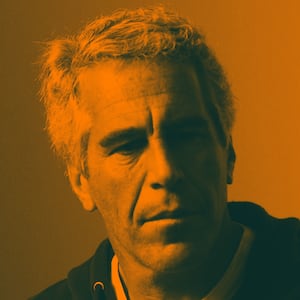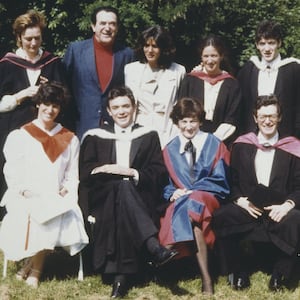Ghislaine Maxwell, the British socialite and accused accomplice to wealthy sex offender Jeffrey Epstein, was never offered a plea deal related to her sex-trafficking case, prosecutors said on Monday.
Maxwell, 59, appeared in Manhattan federal court for a lengthy hearing that addressed issues over witness testimony and proposed exhibits ahead of her trial date later this month—including the Little Black Book of famous names and addresses that Epstein’s former butler claimed he snatched from the financier’s Palm Beach lair.
When U.S. District Judge Alison J. Nathan asked Maxwell whether the government and her lawyer were correct in stating a plea bargain wasn’t offered to her, she confirmed before softly adding, “I have not committed any crime.” One of Maxwell’s attorneys, Bobbi Sternheim, also indicated the defense never asked for a deal.
ADVERTISEMENT
Meanwhile, Sternheim raised concerns over Maxwell’s treatment by guards at the Metropolitan Detention Center in Brooklyn and by U.S. Marshals who brought the former socialite to the federal courthouse. According to Sternheim, jailers woke Maxwell up at 3:45 a.m. to get to court around 5:30 a.m. despite her hearing being scheduled for 11 a.m.
Sternheim said Maxwell was placed in a “cold cell” and “given little food and no utensils.” When Maxwell began nodding off, a guard “poked” her to stay awake even though she was the only inmate in the cell, the lawyer continued.
And, Sternheim said, because of Maxwell’s shackles on her ankles, “she had to get on her hands and knees just to climb in the van” transporting her to court.
“These conditions are just terrible,” Sternheim told Nathan.
In response, Nathan asked assistant U.S. Attorney Alison Moe to inquire as to whether Maxwell is receiving “differential treatment” compared to other inmates awaiting trial.
Just before the hearing began, Maxwell was escorted into court with a handcuffs chain wrapped around her navy jumpsuit. One of her sisters, who declined to comment, was seated in the gallery and waved to her. (Maxwell has twin sisters, Isabel and Christine, but it’s unclear who was present on Monday. Isabel previously showed up to court this year in a black beret, and the person in the gallery this time wore a red one.)
When Nathan ruled against Maxwell’s motion to bar the words “victim” and “minor victim” at trial and instead refer to “all persons by their individual names,” Maxwell’s sister visibly shook her head in response.
Nathan also granted the government’s motion to permit witnesses and non-testifying witnesses to be referred to in court by pseudonyms or first name only—a practice that’s consistent with the Crime Victim’s Rights Act related to victims of childhood sexual abuse. “There is a need here to prevent any undue harassment … by the press and third parties,” Nathan said.
In another blow to Maxwell’s legal team, Nathan granted the prosecution’s request to ban evidence about the 2005 Florida investigation of Epstein not resulting in charges against Maxwell, and Epstein’s infamous non-prosecution agreement, which shielded any of his alleged accomplices. Nathan said the court would not hear “defense evidence that goes to the thoroughness of the government’s investigation”—or whether the government improperly charged Maxwell in the aftermath of Epstein’s suicide in August 2019—to avoid a “trial within a trial.”
But Nathan did rule that certain evidence from the prosecution—including emails that allegedly show Maxwell setting up dates between men and adult women—are inadmissible and irrelevant to the case. Moe argued the emails showed Maxwell was “offering up women based on physical description and not in a matchmaking capacity” and mirrored how Maxwell allegedly served up minor victims to Epstein.
One other sore point for the prosecution could be Epstein’s Rolodex of high-powered people and victims and their families. Because the address book was dated around 2005 and surfaced four years later when Epstein’s former butler Alfredo Rodriguez tried to sell it to victims’ lawyers, it may fall outside the scope of Maxwell’s alleged conspiracy. The British heiress and oceans advocate is charged with grooming and trafficking four minor victims from a time period spanning 1994 to 1997 and 2001 to 2004.
In a motion filed last week, Maxwell’s lawyers argued the document, filed as Exhibit 52, “has no identified author, date of creation, or custodian.” They added, “As produced, the document appears to be a compilation of material that was copied from more than one source, arranged, and paginated after the fact.” (On Monday, Nathan asked prosecutors to brief the court on the address book in a filing due Nov. 11.)
A second motion from Maxwell’s attorneys relates to statements from alleged co-conspirators in the case, though the identity of these individuals isn’t known.
Defense lawyers indicated that “the government identified three purported co-conspirators for purposes of trial” but failed to disclose which co-conspirator statements it intends to introduce. “None of the identified purported co-conspirators are available to testify at trial,” Maxwell’s filing added. “Jeffrey Epstein is dead, and neither [of the co-conspirators] have been granted immunity for their trial testimony. Accordingly, Ms. Maxwell cannot cross-examine any identified co-conspirator about whether he or she made any yet-to-be attributed statement.”
In a recent letter to the defense, prosecutors said they will likely call a witness who was employed by Epstein who “will testify about her role in scheduling sexualized massages for Jeffrey Epstein with underage girls.”
On Monday, Nathan ordered the government to reveal to the defense which co-conspirator statements it plans to introduce to jurors. Defense lawyer Jeffrey Pagliuca argued that any statements that were made after 2004 in Maxwell’s alleged sex-trafficking conspiracy would be hearsay and inadmissible, while Moe said the statements will illustrate how the trafficking scheme operated even if outside the timeframe of the charges.
Maxwell’s team is also seeking to exclude evidence related to a woman referred to as Minor Victim 3. The indictment against Maxwell states that she groomed this woman for Epstein when Minor Victim 3 was a teenager in London from 1994 to 1995.
In a filing last week, Maxwell’s lawyers argued Minor Victim 3 was above the legal age of consent in the U.K.—which is 16 years old—when the alleged sex acts occurred.
Another lawyer for Maxwell, Christian Everdell, told Judge Nathan on Monday that the unidentified victim “was of legal age in every jurisdiction” where the alleged abuse took place and argued that Maxwell wouldn’t be charged solely based on the woman’s accusations.
“It seems like the government is trying to take an episode of legal conduct and make it sound salacious for the jury,” Everdell fumed.
Nathan asked prosecutors to address this concern in a future filing.
“Minor Victim 3 will describe unwanted conduct in a way that closely mirrors what happened to other victims,” Moe said, adding that the woman would be able to speak to Maxwell’s knowledge of Epstein’s preference for young girls.








